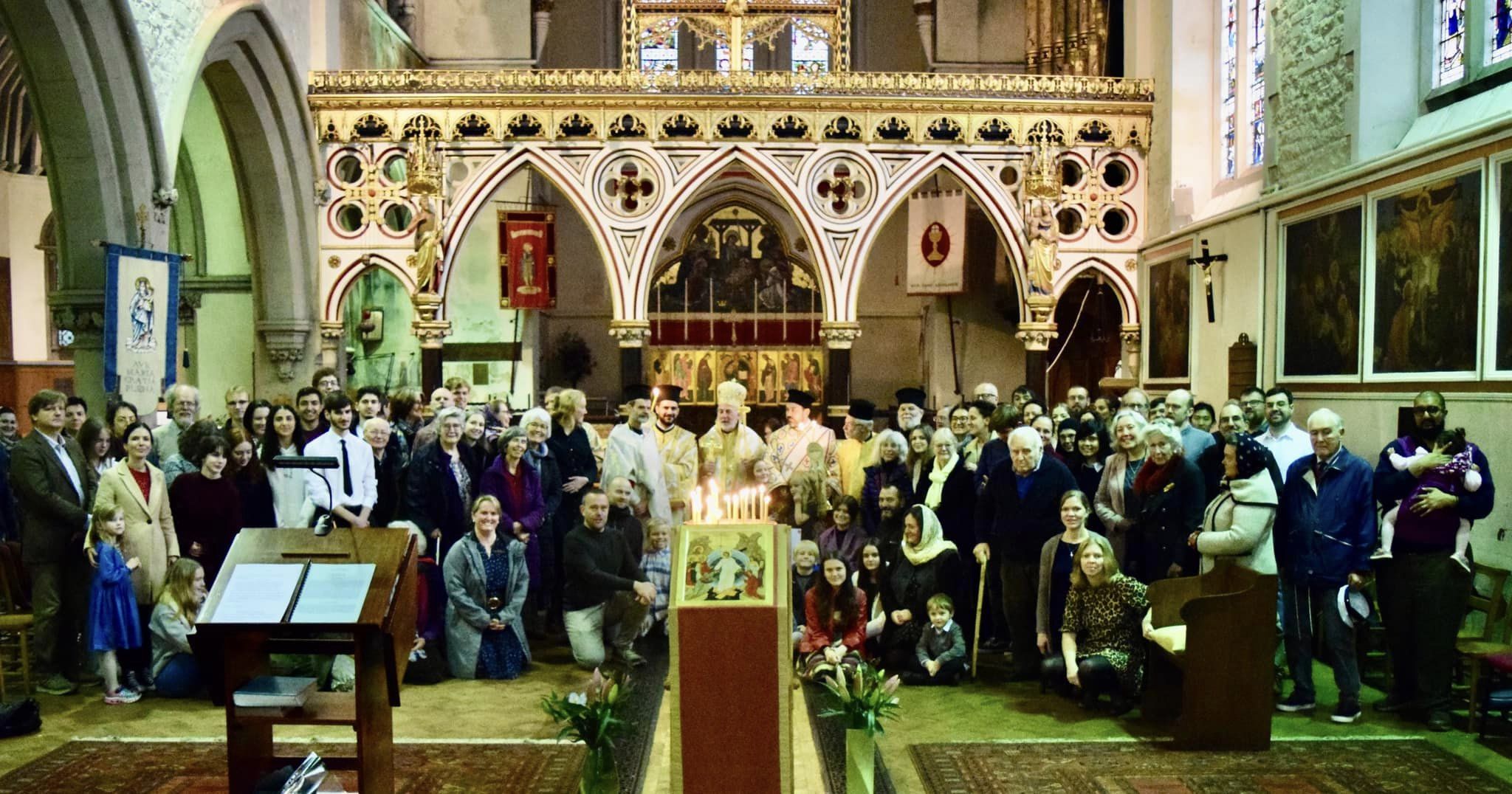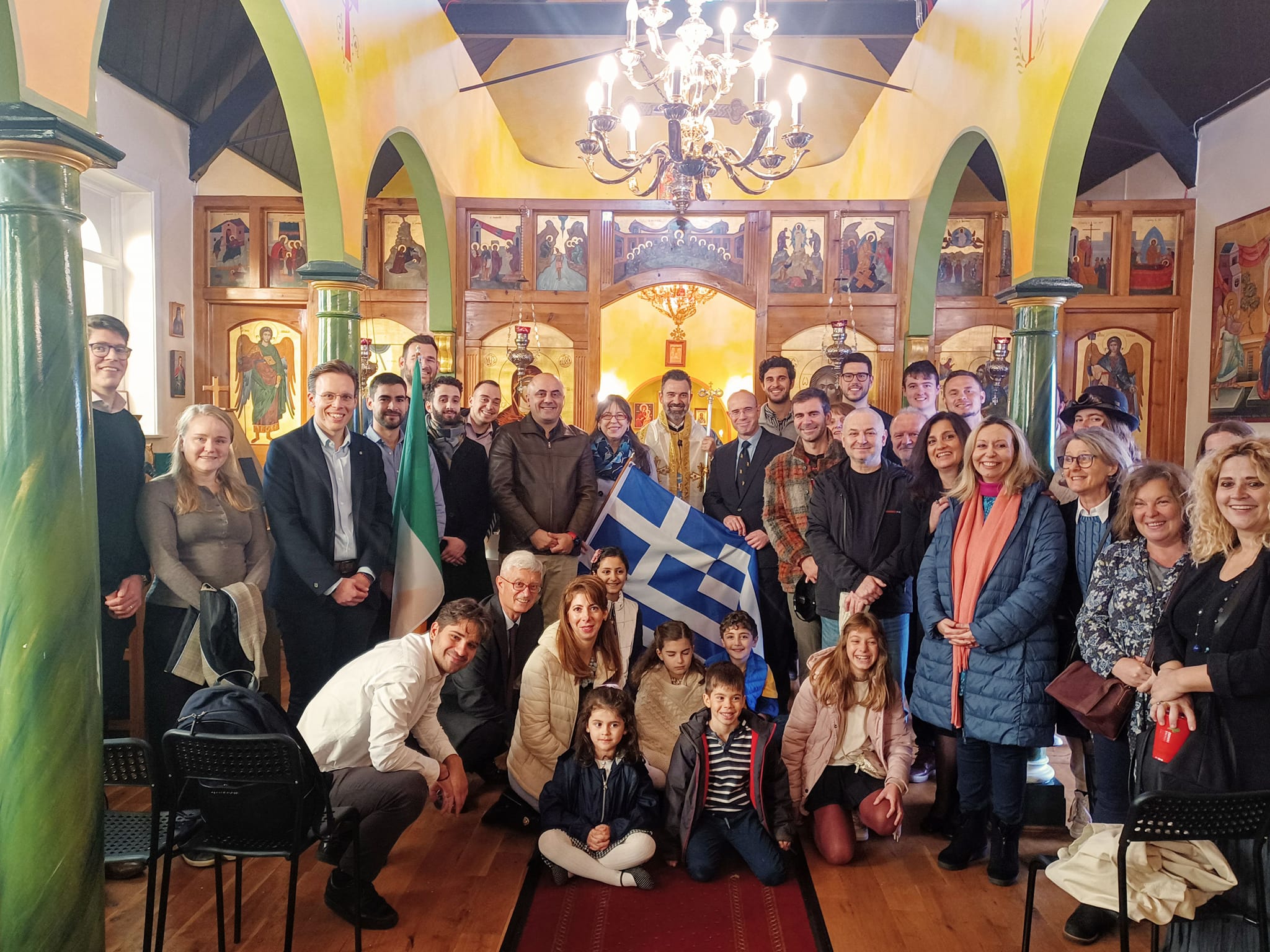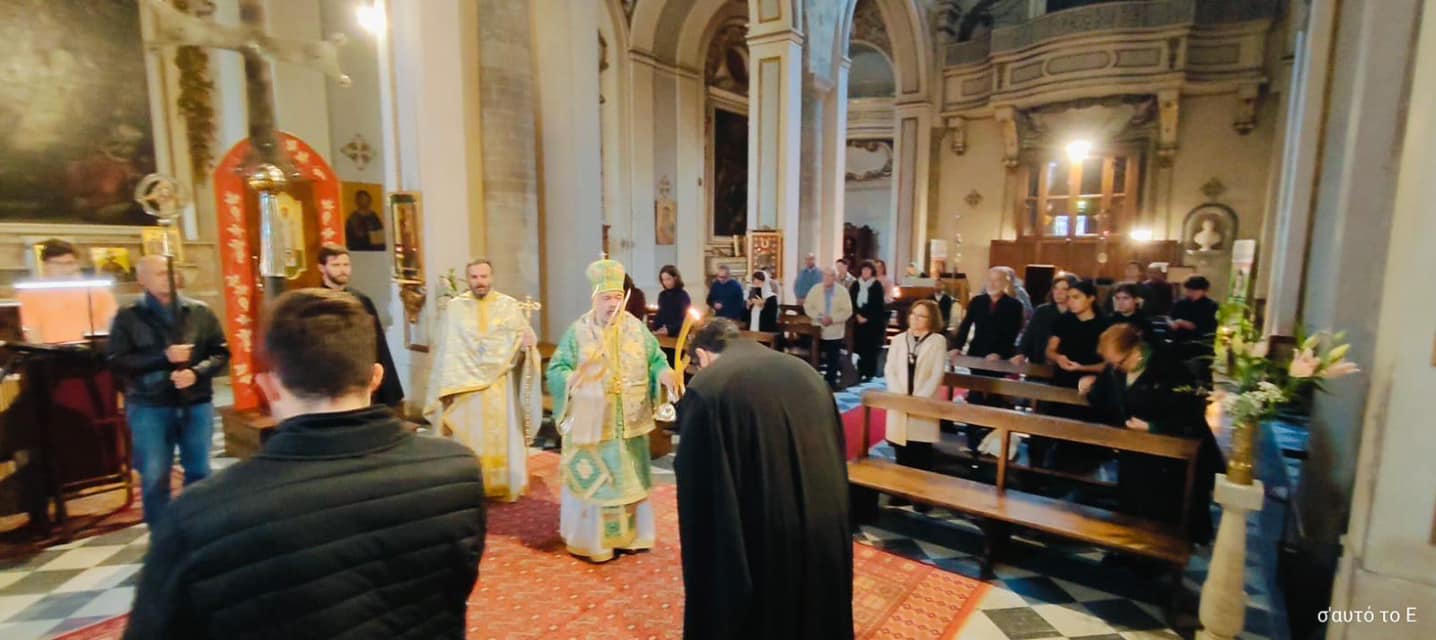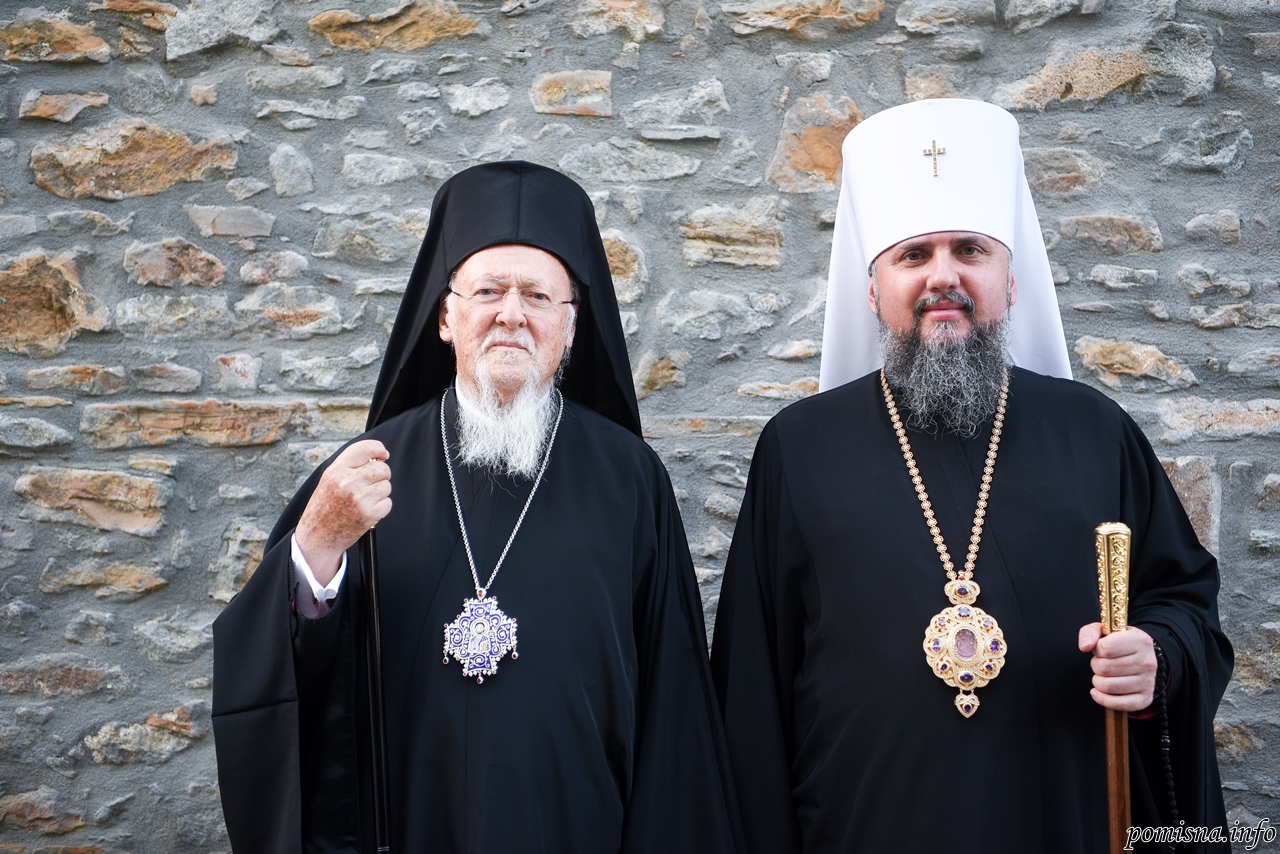The Parable of the Rich Man and Lazarus
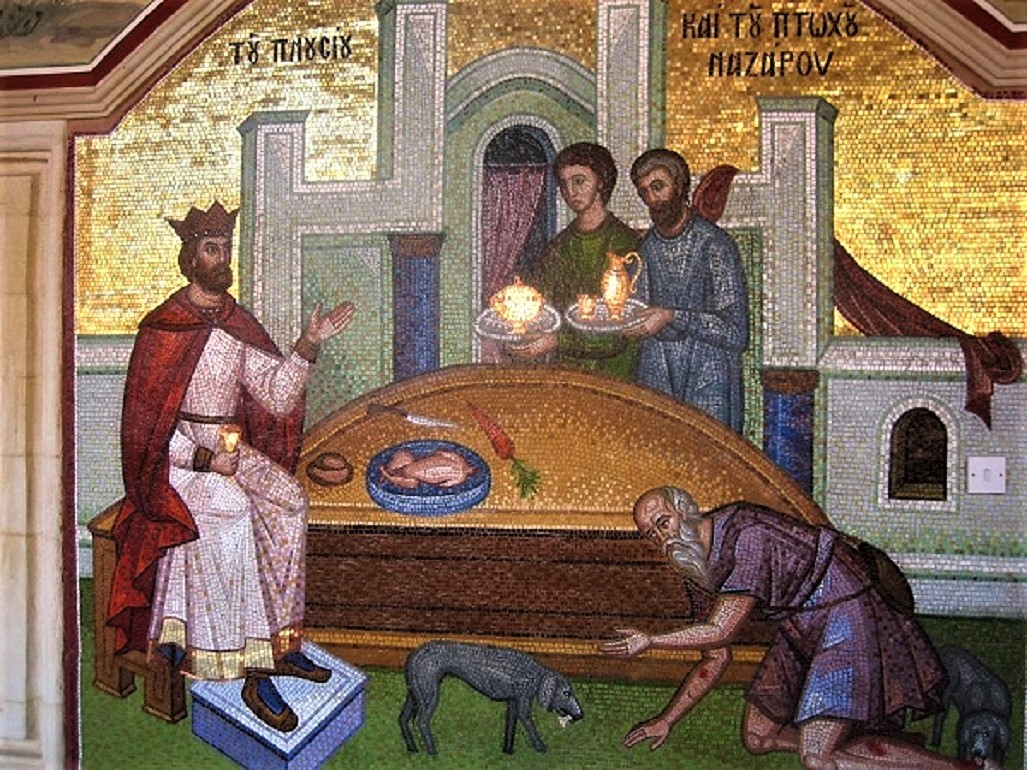

By Metropolitan Ierotheos of Nafpaktos and Ayios Vlasios
There’s much to be learned from Christ’s wonderful parable. We can look at its social dimension and also draw a great many ethical and moral conclusions. But I’d like to dwell more on issues which have to do with life after death, that is to analyze the parable in terms of the last days.
First. It’s clear from the parable that life after Christ’s Second Coming is not what is being addressed, but what happens to the soul after death, that is, between the departure of the soul from the body and the Second Coming. This is the period which is called the intermediate state of our souls. Christ speaks of the Second Coming on other occasions, when He will come to judge people after the resurrection of the bodies, and the souls will be re-united with them so that we can enjoy the fruits of our actions in this life.
Second. It’s also made clear that there’s death in our life. Both Dives [‘the rich man’ in Latin] and Lazarus died. Death is the separation of the soul from the body. This state is also known as sleep, because death itself was abolished with the Resurrection of Christ. With His Passion, Cross and Resurrection, Christ did away with death as a reality and gave us the opportunity to transcend it by living in the Church. The fact that death is now a sleep, a temporary state, is clear from the manner in which the saints die, since they all hope in Christ and leave us their uncorrupted and wonder-working relics.
God didn’t create death, but death is an intrusion into nature, because it’s the result of our sin and our separation from God. There’s death of the body and death of the soul. Death of the soul is the removal of God’s Grace from the soul, and death of the body is the separation of the soul from the body.
Everyone tastes the dread mystery of death, because we’re all heirs to decay and mortality; in other words, we were born to die. Death is the most certain and sure fact of our life. Even modern existentialist philosophers say the truest event is ‘living to die’.
But although death is the most certain event, the day and hour of its occurrence is not known. Nobody knows when they’ll die. The thing is that we should live well, so that how we die will bring us to eternal life. The parable says that the poor man died and that the rich man died and was buried. Death is therefore the greatest democrat, since it makes no exceptions.
Third. On its separation from his body, Lazarus’ soul was taken by the angels and brought to the bosom of Abraham. This means that angels exist- including each person’s guardian angel- and they receive the souls of the righteous and take them to God.
According to another parable, however, the souls of unrepentant sinners are taken by the demons. The foolish rich man heard a voice from God: ‘You fool! This very night your life is being demanded of you. And to whom will the things you prepared belong?’ (Luke 12, 20). The verb ‘demand’ refers to the demons who claim the souls of sinful people in order to constrain them eternally.
At the dread hour of death, when the soul is parted violently from its harmony with the body, terrible things occur. The souls of the holy are received by the angels, and those of sinners by the demons. In the teaching of the Fathers of the Church, there’s mention of what are called ‘toll-gates’, which are the demons, the wraithlike spirits that desire and seek to keep people’s souls for all eternity. Naturally, the demons can have no hold over the souls of holy people who’ve become united to Christ and have the seal of the Holy Spirit.
By ‘toll-gates’, the Fathers of the Church mean both the hatred and the hostile mania of the demons, as well as the existence of the passions, which demand satisfaction but can’t be satisfied, because the body no longer exists. It’s precisely this state that chokes people’s soul, which experiences the most terrible desolation. This torturing of the soul is like someone being held in solitary confinement in prison, with no opportunity to sleep, eat, meet other people and so on. The passions then become truly inflamed, as does that person’s whole existence.
The fact that people’s souls will be received either by angels or demons is related to the state they’re in. As the Fathers says, angels and souls are spiritual beings in relation to the body, though in relation to God they are also somewhat material. This is why angels are called ethereal beings and aren’t entirely immaterial. The soul, meanwhile is created, which means it’s made by God. It’s immortal by Grace, since this immortality is a gift from God. Everything created has a beginning and an end. The soul is created and has a specific beginning, but has no end, because God so decided.
Fourth. Although the soul of Lazarus went to the bosom of Abraham and that of the rich man went to hell, Christ says in the parable that Lazarus went to the bosom of Abraham and that this particular rich man went to hell. It’s further mentioned that the rich man saw Abraham from afar, with Lazarus in his bosom.
This is of great importance, because it means that despite the separation of the soul from the body, the hypostasis, the actual person of the man or woman is not abolished. Of course, the soul didn’t exist before the body, but was created at the same time. Equally, the soul by itself doesn’t constitute the person; nor does the body alone constitute the person. Despite the temporary separation of the soul from the body, the person isn’t split asunder. This is apparent from the fact that the soul retains its consciousness and even, according to the Fathers of the Church, remembers the constituents of its body which has remained in the earth and may have been scattered or dissolved into the elements of which it consisted. At the Second Coming, by God’s Grace, the soul will reunite the elements of the body and the whole person will come together again. Of course, the bodies of the righteous and the unrighteous will be spiritual then, that is, they won’t need nourishment nor will they be restricted by space or any other limitations. The resurrection is a gift which is given to everyone, righteous and unrighteous alike.
It ought to be noted that in this parable Christ mentions the name of the poor man, but omits that of the rich man. This indicates that, because Lazarus lived with God, he was a saved person, a real entity, whereas the rich man, while still a human being, wasn’t a saved person. This means that real people are those with souls, bodies and also the Grace of God within them. If people don’t have Grace, they still exist ontologically as persons, but they have no connection with God, for the simple reason that they’ve submitted to material things. Instead of being turned towards God, their mind is focused on matter and is subject to it.
Fifth. In the parable it says that when the rich man was in hell, he saw Abraham with Lazarus in his bosom. By ‘Abraham’ here, we’re meant to understand ‘God’. Being in the bosom of God means being in communion with Him.
Behind the bosom, behind the chest, lies our heart. The heart is the engine of biological life, but is also the symbol of love. The greater the love, the greater the knowledge, since knowledge is closely bound to love. And, of course, this love promotes communion and unity. So if you’re ‘in the bosom’ it means that you’re linked to the person you love, that there’s unity between you.
So the expression that Lazarus was ‘in the bosom of Abraham’ is a graphic indication of his communion with God, which is linked to knowledge and love. When we talk about knowledge of God, we mean ‘communion in existence’. It’s not cerebral knowledge but knowledge linked to love, to life itself.
Lazarus seems not to be disturbed by the dreadful suffering of the rich man. He doesn’t see hell, although the rich man does see paradise. This is because, according to the Fathers of the Church, those who live in the uncreated light, gazing upon the wonderful vision of God, forget all about the world. The light is so great, so blinding that it doesn’t allow you to see anything else. This doesn’t mean that the saints don’t pray for the whole world. They do pray and intercede with God and are in more direct communication with Him. But they’re in a state of which we can’t conceive. It’s only if we see it through the experiences of the saints that we can understand it.
Sixth. While Lazarus was in the bosom of Abraham, the rich man was burning in hades. Indeed, he would beg Abraham to send Lazarus to cool his tongue, because ‘I am in agony in this flame’.
The place the rich man is in is hades, not hell. Hell begins after Christ’s Second Coming and the Judgement. After their separation from the body, the souls of sinners dwell in hades. According to the teachings of the Holy Fathers, hades is a spiritual location, a foretaste of hell, when people will endure God’s energy as fire.
There were lengthy discussion on these issues at the Council of Ferrara-Florence, and the revealing views and teaching of Saint Mark of Ephesus have survived. The fire in which the rich man was burning wasn’t the so-called fire of purgatory of the Latins, through which the souls of all humankind pass. It wasn’t created fire, but uncreated. In other words, sinners also receive the rays of divine light, but, because they died without repentance, without being healed, they experience this light as fire. So, depending on their degree of health or sickness, people receive the same Grace as either light or fire.
It ought also to be noted that the rich man saw Abraham with Lazarus in his bosom, he saw the glory of Abraham, but had no part in it. Lazarus, on the other hand, both saw the glory and participated in it. This is a very important point, because it shows that in the next life everyone will see God, but only the righteous will have communion and participation. The unrighteous won’t. A characteristic example is Christ’s description of the Judgement: everyone will see the Judge, everyone will talk to Him, but some will enjoy His glory and others will experience the energy of Divine Grace as fire.
Seventh. The rich man was interested in his brothers living in the world, and asked Abraham to send Lazarus to tell them to repent. Therefore, despite the separation of our soul from this world, there’s still knowledge and communication; interest is still expressed.
Together with other features, this demonstrates what we said earlier: that the parable of the rich man and Lazarus doesn’t have to do with life after Christ’s Second Coming, but is concerned with life after death and before the Second Coming. Clearly this is the midway state of the souls.
The saints are interested in the salvation of the world. By God’s Grace, they hear our prayers and bring them before God. This is why we pray to them. Through the feasts we’ve established in their memory, we show that they’re saints, that they’ve been united to God, that they’re awaiting the resurrection of the bodies and that, with their incorruption, they’re enjoying a prelude of the future age. We’re also interested in those who’ve fallen asleep. We pray to the saints that they’ll pray to God for us, and at the same time we pray for mercy for all the departed. Apart from the fact that this is an example of communication between us, it’s also an expression of something deeper.
According to the teaching of the Holy Fathers, when we begin to repent, to enter the arena of purification, it’s a process of constant development. It’s perfection over time, both in the midway condition of the souls as well as in the life after the Second Coming. The degrees of the spiritual life are purification, enlightenment and deification. Of course, these shouldn’t be understood as hermetically sealed states, but as participation in God’s Grace. If we strive to become cleansed, then the Grace of God which purifies us is called cathartic energy. When our nous is enlightened, it means that it receives the energy of God which is enlightening it and this is called enlightening energy. And when we’re deified, this is through God’s Grace and is called deifying energy. The progression is continuous. So all those who repent before their soul leaves the body continue to grow and become more able to accept uncreated Grace. This is why we have memorial services and why we pray for the departed.
But those who don’t repent before the soul leaves the body, since they have no spiritual vision, experience the energy of God only as fire and, of course, never have any prospect of participation in what is good. But we still pray for everyone, because we don’t know their inner spiritual state.
Eighth. In the parable, it says that between the place where Abraham was and hades, where the rich man found himself, there was a ‘great chasm’. And that it wasn’t possible to cross from one side to the other.
Naturally, this is not any particular place, but, as we mentioned above, a particular manner of existence. There’s a clear distinction between Heaven and Hell as a specific way of life.
Heaven and Hell don’t exist from God’s point of view but from ours. God sends His grace upon all people, since ‘He makes the sun rise upon the righteous and the unrighteous; and the rain fall upon the wicked and the good’. If God’s given us a commandment to love all people, including our enemies, it’s because He does the same. It’s impossible that He shouldn’t love sinners. But people experience the love of God differently, depending on their individual spiritual state.
Light has two capacities: to illumine or to burn. If you’ve got good sight, you benefit from the effulgent properties of the sun- light- and the whole of creation rejoices. But if you’re deprived of your sight, you feel only the burning capacity of light. The same will be true in the next life, too, as well as in the life of the soul after its exit from the body. God will continue to love those in Hell, but they won’t feel this love as light. They’ll experience it as fire since they won’t have spiritual eyes and spiritual sight. Something similar is true also of Holy Communion. Everyone can take Communion, but for those who are prepared it becomes light and life, whereas for those who aren’t it’s judgement and condemnation.
The Church presents this in the depiction of the Second Coming. We see light emerging from the throne of God, in which the saints bask, and, from the same throne, a river of flames springing forth, inundating the unrepentant sinners.
This is why, in the Orthodox Church, we place so much emphasis on curing people. The Church is a spiritual hospital, a sanatorium where the spiritual eye, the nous, can be treated. This is what is ailing and this is what needs to be made whole. This is the whole task of the Church.
Ninth. Abraham doesn’t respond to the request of the rich man to send Lazarus to earth to preach repentance to his brothers. He justifies his position by saying that if people don’t listen to Moses and the Prophets, they won’t be convinced ‘even if someone should rise from the dead’.
Carnal people won’t repent, no matter how many miracles they see in their lives. They live in a deathly sleep. This is a reality. Unless our freedom is brought into play, there’s no repentance. Everything occurs through the operation of God and the cooperation of people.
The greatest event in history is the incarnation of Christ, His Resurrection, and the foundation of His Church, which is the Body of Christ risen as God and human person. If you aren’t moved by that astonishing reality, if you can’t be persuaded by the life of so many saints who are members of the Body of the risen Lord, then you aren’t going to be convinced by any miracle, however great it might be.
Our salvation and rebirth isn’t a matter of conjuring tricks, but is the product of the free expression of our will, the result of pain, sweat and struggle. Unfortunately, many people in this day and age are content with ‘magical’, external events. Becoming convinced of the existence of the next life, is a matter of inner spiritual sensitivity. Because even if someone’s raised from the dead, there’s a fair chance it’ll be taken as a ghost.
There’s much talk today about out-of-body experiences. Some people say that their soul left their body or came close to such an exit, but then returned to the body. These people relate the terrible things they saw and faced. In the Orthodox Church, we recognize that there have been instances when the soul has re-entered the body, in other words cases of resurrection, but with the power of Christ. These are exceptional events, however, and don’t just happen to anyone. There are saints who underwent such awe-inspiring events, because they experienced Paradise and Hell in their lives, they lived the fires of hades, they saw angels and demons. When they returned to themselves, they lived a life of repentance and preached repentance to other people. But most of these experiences are either demonic or the result of repressed desires or episodes in the past, are fantasies or even states induced by the tranquillizers and narcotic drugs given to alleviate pain in terrible sicknesses. In reality, it takes great discernment to be able to distinguish between these conditions and to know whether they come from God, from the devil or from psychological and bodily aberrations.
We in the Church don’t wait for the raising of saints or experiences of such states before we believe. We have Holy Scripture, the lives of the Prophets, the Apostles and the saints; we have their words and teachings; and we also have their holy relics as well as conviction regarding eternal life. At times, each of us is allowed by God to experience Heaven and Hell in our hearts.
Other than that, we keep Christ’s commandments in order to effect our cure, and in this way we resolve many existential, inter-personal, social and ecological problems. Observation of God’s commandments makes us balanced people.
Tenth. The parable of the rich man and Lazarus also shows us the means we must use to effect our healing, so that after death and Christ’s Second Coming, we can experience God as light, not fire. Abraham said to the rich man: ‘They have Moses and the Prophets. Let them listen to them’. We have to observe the Law and submit to the Prophets of every era.
A Prophet is someone who, by God’s grace, sees the mysteries of the age to come and who tastes the Kingdom of God even in this life. There are Prophets such as this in both the Old and the New Testaments. They received the Revelation, they lived in the Kingdom of God, they came to know its mysteries and then passed them on to the people.
The Prophets, who are to be seen as the real theologians and spiritual fathers, regenerate people and lead them towards life. Spiritual guidance is linked to and identified with our spiritual rebirth. In reality, you can’t be reborn unless you’re connected to a person of God, a Prophet.
And there are Prophets in this day and age, too, who are preaching repentance, a return to God, and who are pointing to another way of life and thinking. Even if we can’t meet such a Prophet, we have the words of the Prophets and, through reading them, we can learn about the Kingdom of God and what we must do to enjoy it.
Source: pemptousia.com

